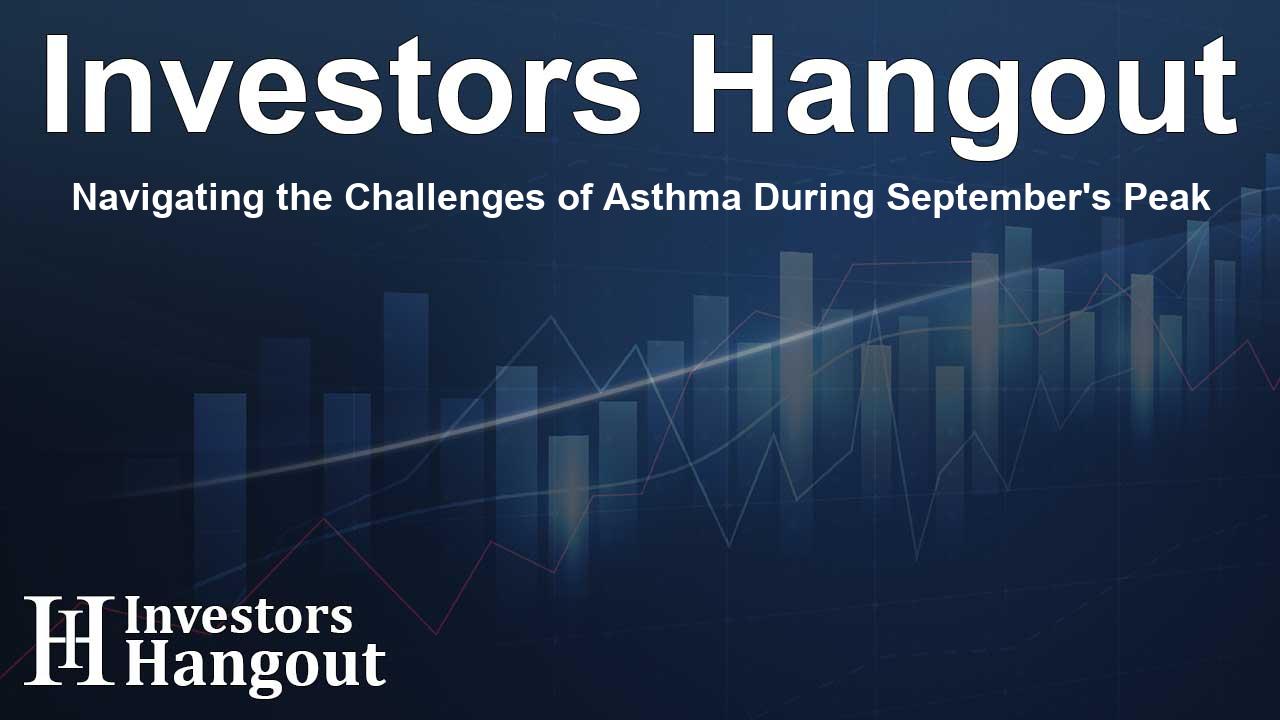Navigating the Challenges of Asthma During September's Peak

The September Asthma Peak: What You Need to Know
This time of year, September, marks a critical period for those with asthma. Returning to school means children face a heightened risk of respiratory infections, with common colds and flu making their rounds. This, combined with an increase in weed pollen and mold counts, sets the stage for an asthma spike that can severely impact individuals' health.
Understanding the Risks Involved
According to health experts, September's challenges are multifaceted. Kids, especially, are particularly vulnerable as they come into contact with various illnesses within school environments. The air quality in many schools can be questionable due to factors like poor ventilation and even mold exposure—common asthma triggers.
The situation is compounded by seasonal changes. Outdoor mold and weed pollen typically peak this month. These allergens, alongside atmospheric disturbances from hurricanes or wildfires, increase air pollution and irritants, further aggravating asthma symptoms. Changes in the weather, including high humidity or sudden temperature drops, can also exacerbate respiratory issues.
Effective Asthma Management Strategies
Fortunately, there are proactive steps individuals can take to mitigate these risks and manage their asthma effectively:
- Schedule a consultation with your healthcare provider or asthma specialist. Discuss any recent symptoms and take a close look at your medications to ensure they're still suitable for your situation.
- Ensure that your asthma and allergy medications are up-to-date, and always follow the prescription guidelines. This means having enough medication on hand and knowing what to do if symptoms arise.
- Get vaccinated! Annual flu and COVID-19 vaccinations are crucial, mainly because it typically takes about two weeks to build immunity. Consult your doctor for any additional recommended shots.
- Practice good hygiene during this season: frequent handwashing and avoiding direct contact with sick individuals can significantly decrease your chances of getting ill.
- Wearing a high-quality mask in crowded places can not only protect you from airborne viruses but also help reduce exposure to pollen and mold when they are prevalent.
- Improve your home’s air quality. Regularly replace HVAC filters and consider using portable air purifiers to reduce allergens in your living spaces.
- If ragweed or mold allergens affect you, make it a priority to limit your time outdoors when counts are highest.
- Take care of your overall health with sufficient sleep, hydration, a balanced diet, and regular exercise to help manage stress effectively.
Community and State-Level Resources
Asthma can also be managed at the community and state levels. The National Asthma Control Program (NACP), supported by the CDC, collaborates with local authorities and educational institutions. Their goal is to implement effective strategies that improve asthma outcomes across various states. Research indicates that due to these state initiatives, there have been significant reductions in both asthma-related deaths and emergency room visits due to asthma complications.
Despite recent budget proposals not including continued funding for the NACP, advocacy efforts are underway. Organizations are urging Congress to continue supporting these vital programs to ensure necessary resources remain available for state management initiatives.
Why Continued Support Matters
As highlighted by leading asthma advocacy groups, many state programs rely heavily on CDC funding to offer comprehensive asthma management services. Cutting this funding could lead to a rise in missed school and workdays and increased health complications during this critical respiratory season. Continued investment in state asthma programs is essential, especially as September kicks off its challenging peak.
Conclusion
This September, it’s crucial for individuals struggling with asthma, particularly children, to remain vigilant about their condition. By understanding the triggers associated with this month and adopting effective management strategies, you can navigate this peak period successfully and prioritize your health.
Frequently Asked Questions
What causes the asthma peak in September?
The asthma peak in September is primarily due to returning school routines, rising pollen and mold counts, and seasonal respiratory illnesses.
How can I manage my asthma during this peak season?
To manage asthma effectively, consult with your healthcare provider, ensure your medications are up-to-date, practice good hygiene, and improve indoor air quality.
Is vaccination important for people with asthma?
Yes, annual vaccinations for flu and COVID-19 are critical for individuals with asthma to prevent complications from respiratory infections.
Why are good hygiene practices crucial during September?
Good hygiene practices help minimize your risk of catching respiratory infections that could lead to asthma flare-ups.
What resources are available for asthma management?
State programs, the CDC’s NACP, and local health departments provide various resources and support for individuals managing asthma.
About The Author
Contact Kelly Martin privately here. Or send an email with ATTN: Kelly Martin as the subject to contact@investorshangout.com.
About Investors Hangout
Investors Hangout is a leading online stock forum for financial discussion and learning, offering a wide range of free tools and resources. It draws in traders of all levels, who exchange market knowledge, investigate trading tactics, and keep an eye on industry developments in real time. Featuring financial articles, stock message boards, quotes, charts, company profiles, and live news updates. Through cooperative learning and a wealth of informational resources, it helps users from novices creating their first portfolios to experts honing their techniques. Join Investors Hangout today: https://investorshangout.com/
The content of this article is based on factual, publicly available information and does not represent legal, financial, or investment advice. Investors Hangout does not offer financial advice, and the author is not a licensed financial advisor. Consult a qualified advisor before making any financial or investment decisions based on this article. This article should not be considered advice to purchase, sell, or hold any securities or other investments. If any of the material provided here is inaccurate, please contact us for corrections.
